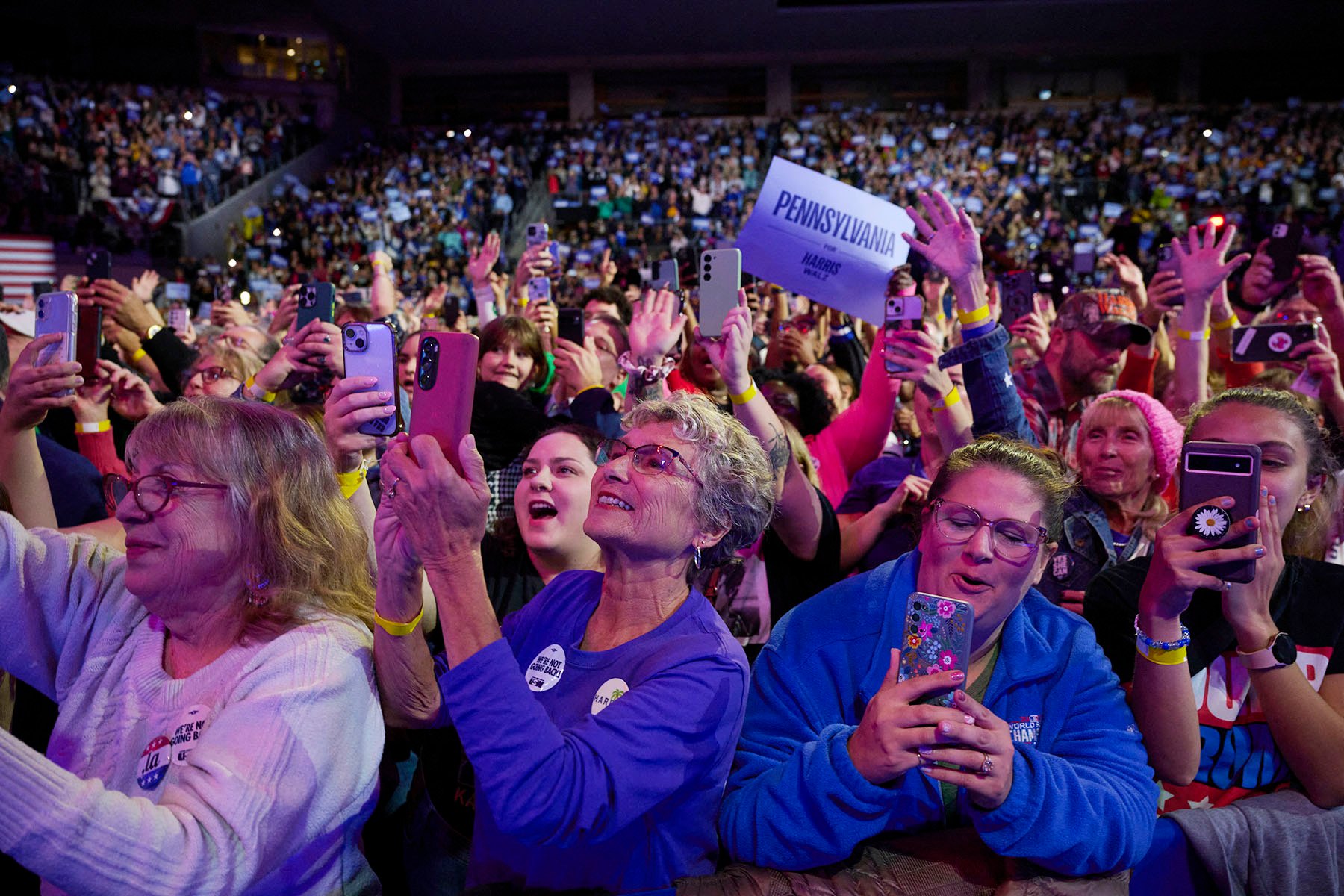Your trusted source for contextualizing Election 2024 news. Sign up for our daily newsletter.
WASHINGTON — On a recent autumn evening, the AARP convened a small group of journalists in a hotel dining room a stone’s throw from the White House to discuss a group of overlooked but dedicated voters that could determine the outcome of the presidential race: Women over 50.
At each place setting was a 25-page briefing packet titled, “She’s the Difference: Women voters 50+.” It was prepared by AARP and pollsters Kristen Soltis Anderson of Echelon Insights, a Republican, and Margie Omero of GBAO, a Democrat. They were present at the dinner to present their findings, making a compelling case for why the group of women they’d started calling the “wild card” demographic could decide whether Republican Donald Trump or Democrat Kamala Harris ends up in the White House.
“We got very interested in older women voters a few years ago — nobody else was really focusing on them,” AARP Executive Vice President Nancy LeaMond said at the top of the briefing. “There are 63 million women voters over the age of 50 and about 97 percent of them say they are going to vote.”
Women over 50 are high-propensity voters — voter turnout rates increase with age and women vote at higher rates than men. So, in the final weeks ahead of an election, while campaigns focus on turning out other demographic groups at risk of staying home, like Gen Z voters or Black men, for women over 50, it’s still about persuasion. And they have expressed openness to it: AARP polling shows that this year, women over 50 have moved more than any other group of voters, including younger women and men in the same age bracket. And they moved in Harris’ favor.
“Young women had not really moved, they were voting for the Democratic candidate before, they were voting for the Democratic candidate afterwards. Older men had not really moved, they were supporting Trump before, they were supporting Trump afterwards. Younger men had moved a little bit, but it wasn’t a large amount of movement. The biggest movement, far and away, was these women, 50 plus,” Soltis Anderson said.
In January, women over 50 supported President Joe Biden by 3 points; by September they supported Harris by 12 points. Over the same time period, women under 50 went from supporting Biden by 15 points to supporting Harris by 11 points. Men over 50 went from supporting Trump by 11 points to supporting him by 12 points.
“We were a little bit torn on how to describe them, and we wound up settling on the term ‘wild card,’ because swing voter is so overused, and swing voter assumes that somebody doesn’t really know what they’re gonna do,” Soltis Anderson said.
“We know that women over 50 are very plugged in. They are focused on the news, they are educated, they are motivated, they are ready to participate … Now do I think that that means that on Election Day they will definitely be a group that is double digits for Kamala Harris? I don’t think that’s guaranteed. I think that, because this group is so plugged in, because they told us in our poll that they felt that elected officials were not doing a good job of listening to their economic concerns, that they still are a group that is available to someone like Donald Trump.”
Soltis Anderson and Omero explained that women over 50 have consolidated thus far behind Harris in large part because they trust the vice president to do a better job handling the issues most important to them — and the issues most important to them reflect concerns that are often unique to their cohort. Just 16 percent of women over 50 think that “elected officials have done a good job understanding the financial challenges of people like them.” Republican women and political independents were more likely to believe that elected officials have done a “poor” job.
Women over 50 are “very uncertain about their long-term economic future,” the polling showed. While 57 percent have enough savings to cover a $500 emergency expense, only 38 percent could cover three months of expenses if they lost their income. Sixty-two percent of women over 50 said they do not feel the economy is “working well for them personally.”
Women over 50 are more likely than men to feel that they are less financially secure than they expected at this stage in life. More than six in 10 women said that they are “much less secure” or “somewhat less secure” than what they anticipated compared to 53 percent of men. Latinas were the least likely to say they were “about where expected” to be financially compared to White or Black women. Womens’ economic concerns were driven in part by the reality that 44 percent of those surveyed did not have a retirement savings account or a pension.
When asked to assess whether various policy measures would help them personally, 84 percent of women over 50 said that what would help them a lot is “protecting Social Security from cuts,” followed by lowering the cost of food, then expanding Medicare to cover dental and vision, then lowering the costs of health care and gasoline.
While women over 50 were somewhat closely divided over whether Harris or Trump would do a better job handling the economy overall (46 percent versus 42 percent), on the issues most important to them, Harris has commanding, double-digit leads. On Social Security and Medicare, 52 percent of women trusted Harris versus 36 percent Trump. On the cost of prescription drugs, 52 percent of women picked Harris versus 35 percent Trump.
“The more specific you got about your economic indicator, the more women over 50 said that they favor Harris over Trump,” Omero said.
Trump’s public pledge to protect Social Security is popular with older voters, though women still trust Harris more. The costs of long-term care for aging adults is another economic issue on which women over 50 preferred Harris by a sizable margin, 48 percent for Harris to 34 percent for Trump.
The AARP briefing occurred just days after Harris announced a plan to expand Medicare to cover the cost of long-term care on “The View,” a morning talk show popular with women. Trump has reiterated his support for a GOP proposal that would provide $5,000 tax credits to those caring for aging family members. Though the AARP is nonpartisan and therefore does not endorse, LeaMond said she was “delighted to see a presidential candidate talk about what is really a crisis, long-term care.”
“Plus, a little reported part [of Harris’ plan], which was also covering vision and hearing as part of Medicare, is definitely a focus for older voters, and especially older women,” LeaMond added.
Social Security is the government’s retirement program — it is a primary source of income later in life for older Americans, particularly those who did not have employer-provided pensions or retirement savings plans. Monthly Social Security benefits are based on work history and women receive average benefits that are only about 80 percent of what men receive, in part due to lower wages, shorter work histories and workforce interruptions to care for children or aging parents. More than half of elderly households report that Social Security benefits make up more than half of their income; for a quarter of elderly households, the benefits make up at least 90 percent. American women live, on average, about six years longer than men.
Kathryn Engelhard, 69, told The 19th after a recent Harris campaign event in Bucks County, Pennsylvania, that protecting Social Security is her top concern headed into November, followed by health care. She described herself as a loyal Democrat who would also have voted for Biden a second time but thinks some of the shift to Harris among women over 50 is also a combination of concern about Republican policies on reproductive health care and the knowledge this could be the last chance to elect a woman president in some of their lifetimes.
“I think the reality of what is going on with women’s rights — especially with JD Vance, it is frightening,” Engelhard said of Trump’s running mate, a U.S. senator from Ohio.
Trump picked Vance shortly before Harris replaced Biden at the top of the Democratic ticket. Other GOP candidates this cycle have questioned whether women are too focused on reproductive rights in the first presidential election since the fall of Roe v. Wade, with one Senate candidate in Ohio saying it was “crazy” for women over 50 to care so much about the issue, given they were past childbearing age.
“I don’t know how many more years I have on this Earth but I’m going to spend it fighting for women,” Engelhard added.
To check your voter registration status or to get more information about registering to vote, text 19thnews to 26797.





